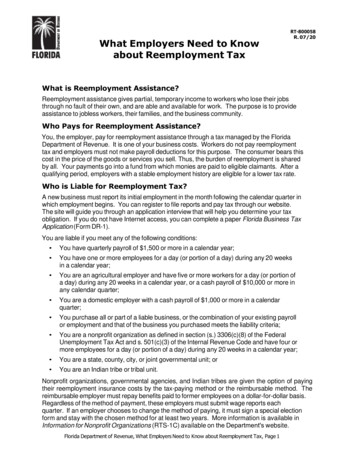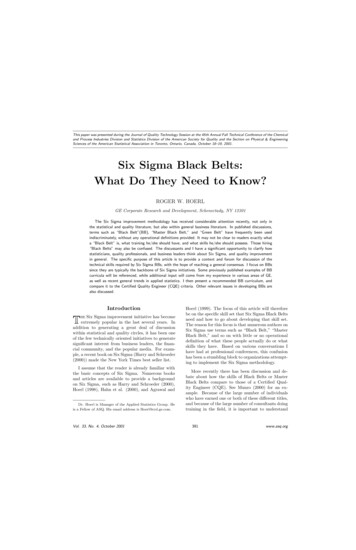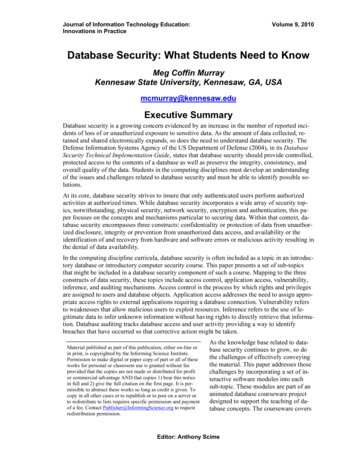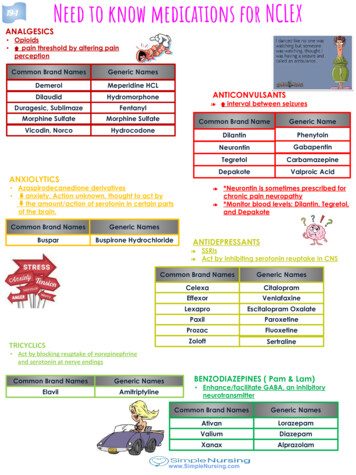
Transcription
What Employers Need to Knowabout Reemployment TaxRT-800058R. 07/20What is Reemployment Assistance?Reemployment assistance gives partial, temporary income to workers who lose their jobsthrough no fault of their own, and are able and available for work. The purpose is to provideassistance to jobless workers, their families, and the business community.Who Pays for Reemployment Assistance?You, the employer, pay for reemployment assistance through a tax managed by the FloridaDepartment of Revenue. It is one of your business costs. Workers do not pay reemploymenttax and employers must not make payroll deductions for this purpose. The consumer bears thiscost in the price of the goods or services you sell. Thus, the burden of reemployment is sharedby all. Your payments go into a fund from which monies are paid to eligible claimants. After aqualifying period, employers with a stable employment history are eligible for a lower tax rate.Who is Liable for Reemployment Tax?A new business must report its initial employment in the month following the calendar quarter inwhich employment begins. You can register to file reports and pay tax through our website.The site will guide you through an application interview that will help you determine your taxobligation. If you do not have Internet access, you can complete a paper Florida Business TaxApplication (Form DR-1).You are liable if you meet any of the following conditions: You have quarterly payroll of 1,500 or more in a calendar year; You have one or more employees for a day (or portion of a day) during any 20 weeksin a calendar year; You are an agricultural employer and have five or more workers for a day (or portion ofa day) during any 20 weeks in a calendar year, or a cash payroll of 10,000 or more inany calendar quarter; You are a domestic employer with a cash payroll of 1,000 or more in a calendarquarter; You purchase all or part of a liable business, or the combination of your existing payrollor employment and that of the business you purchased meets the liability criteria; You are a nonprofit organization as defined in section (s.) 3306(c)(8) of the FederalUnemployment Tax Act and s. 501(c)(3) of the Internal Revenue Code and have four ormore employees for a day (or portion of a day) during any 20 weeks in a calendar year; You are a state, county, city, or joint governmental unit; or You are an Indian tribe or tribal unit.Nonprofit organizations, governmental agencies, and Indian tribes are given the option of payingtheir reemployment insurance costs by the tax-paying method or the reimbursable method. Thereimbursable employer must repay benefits paid to former employees on a dollar-for-dollar basis.Regardless of the method of payment, these employers must submit wage reports eachquarter. If an employer chooses to change the method of paying, it must sign a special electionform and stay with the chosen method for at least two years. More information is available inInformation for Nonprofit Organizations (RTS-1C) available on the Department's website.Florida Department of Revenue, What Employers Need to Know about Reemployment Tax, Page 1
A liable employer must display the poster To Employees (RT-83) where all employees can seeit. Posters are also available in Spanish (RT-83SP).Voluntary CoverageAn employer that is not required to pay reemployment tax may elect to voluntarily providereemployment coverage for its workers. To apply for voluntary coverage, complete and submitthe voluntary Election to Become an Employer Under the Florida Reemployment AssistanceProgram Law (RTS-2) available on the Department's website.Definitions Employment - Any service done by an employee for the employer. Employee - A person who is subject to the will and control of the employer as to whatmust be done and how it is done. Casual Labor - Work that is not in the course of the employer’s regular trade or businessand which is occasional, incidental, or irregular. Do not confuse casual labor with temporaryor part-time employment. A corporation cannot have casual labor. Independent Contractor - A person not subject to the will and control of the employer. Theemployer does not control or direct the manner or method of job performance. The generalpublic is aware that the person is an independent contractor. Officers of a Corporation - Any officer of a corporation performing services for thecorporation is an employee of the corporation during tenure of office, even when nocompensation is received for such services. Compensation, other than dividends uponshares of stock and board of director fees, is presumed to be payment for servicesperformed. Limited Liability Company (LLC) – A limited liability company is treated the same as it isclassified for federal income tax purposes. A person performing services for an LLC,treated as a corporation for federal income tax purposes, is an employee. A person, otherthan a partner or exempt employee of a partnership, performing services for an LLC treatedas a partnership for federal income tax purposes, is an employee. A person, other than thesole proprietor or an exempt employee of a sole proprietorship, performing services for anLLC, treated as a sole proprietorship for federal income tax purposes, is an employee. Asingle member LLC may be treated as a corporation or a sole proprietorship for federalincome tax purposes. S Corporation - Salaries paid to corporate officers are considered wages. All or part of thedistribution of income paid to corporate officers who are active in the business and areperforming services for the business can be considered wages. Employee Leasing Company - An employee leasing company is an employing unit thathas a valid and active license under Chapter 468, Florida Statutes (F.S.). Salesperson - Any individual paid solely by commission under your direction and control isan employee. The law provides exemption for insurance agents, real estate agents, andbarbers who are paid solely by commission. If they are paid by salary only or salary andcommission, both are taxable and subject to reemployment tax. There is no federalunemployment tax exemption for barbers paid solely by commission. Agricultural Labor - Any service performed on a farm in the employ of the owner, tenant,or any other operator of a farm in connection with the production or harvesting of anyagricultural or horticultural commodity or in connection with the maintenance or operation offarm equipment or grounds.Florida Department of Revenue, What Employers Need to Know about Reemployment Tax, Page 2
Employment Not CoveredSome types of work are not covered by Reemployment Assistance and some wages paid forservices are not subject to reemployment tax. These exemptions include: Employees of a church, or convention, or association of churches; or of organizationsoperated primarily for religious purposes that are operated, supervised, controlled, orprincipally supported by a church, or convention or association of churches. Services performed by aliens in agricultural labor, who have entered the United Statespursuant to s. 1184(c) [formerly s. 214(c)] and s. 1101(a)(15)(H) [formerlys. 101(a)(15)(H)] of the Immigration and Nationality Act.Services performed by nonresident aliens, who are temporarily present in the UnitedStates as non-immigrants under subparagraph (F) or (J) of s. 1101(a) (15) [formerly s.101(a) (15)] of the Immigration and Nationality Act.Services for a school, college, or university by a student enrolled and attending classesthere.Work on a fishing vessel under ten net tons.Services performed as a student nurse in a hospital or nurses’ training school, a medicalschool intern in a hospital, or a hospital patient.Students working for credit in a school program such as CBE or DCT.Persons under age 18 delivering or distributing newspapers.Service for government by elected officials; members of the legislature and judiciary;those serving on a temporary basis in cases of fire, storm, etc.; or serving in an advisorycapacity that ordinarily does not require more than eight hours per week. Services performed for a son, daughter, or spouse; or by children under the age of 21 fortheir father or mother. When the employing unit is a partnership, an exempt relationshipmust exist to all partners or there is no exemption. This exemption does not apply tocorporations. Direct sellers who are contracted to sell or solicit consumer goods in homes or placesother than a permanent retail establishment, and whose substantial remuneration isdirectly related to sales.Services performed by a sole proprietor or a partner, or a member of a limited liabilitycompany classified for federal income tax purposes as either a partnership or a soleproprietorship.Services performed by insurance agents, real estate agents, or barbers when paid solelyby commission. Speech, occupational, and physical therapists who are not salaried and workingpursuant to a written contract with a home health agency as defined in s. 400.462, F.S. Service performed by an individual for remuneration for a private, for-profit delivery ormessenger service, if certain conditions are met.Service performed by an inmate of a penal institution (work release programs). WagesWages are payments for services in employment, including commissions, bonuses, back payawards, and the cash value of all payments in any medium other than cash. The cash value ofmeals and lodging will be exempt if it is included as a condition of employment for theconvenience of the employer.Sick and accident disability payments paid by an employing unit to an employee in the sixcalendar months after the calendar month the employee stopped working are wages. Tips areFlorida Department of Revenue, What Employers Need to Know about Reemployment Tax, Page 3
covered wages if received while performing services that constitute employment and areincluded in a written statement furnished by the employee to the employer. Payments madeunder a workers’ compensation law are not wages.Reporting WagesWages must be reported on an Employer’s Quarterly Report (RT-6).The report must list total wages paid to covered workers, excess wages, taxable wages, and taxdue. Each report must show the employee’s name, social security number, gross wages, andtaxable wages paid to each employee during the calendar quarter. If an employer is operatingtwo business units and the secondary unit(s) has a cumulative total of at least ten employees, aMultiple Worksite Report (BLS-3020) must be submitted.An employing unit that files an erroneous, incomplete, or insufficient report shall be billed apenalty of 50 or 10% of any tax due, whichever is greater. The penalty shall not exceed 300per report.Social security numbers (SSNs) are used by the Florida Department of Revenue as uniqueidentifiers for the administration of Florida’s taxes. Social security numbers obtained for taxadministration purposes are confidential under ss. 213.053 and 119.071, F.S., and not subject todisclosure as public records. Collection of your SSN is authorized under state and federal law.Visit floridarevenue.com/privacy for more information regarding the state and federal lawgoverning the collection, use, or release of SSNs, including authorized exceptions.Annual Filing Option for Domestic EmployersAn employer liable for reemployment tax may select an annual filing option if all the employeesexclusively perform services that constitute domestic (household) service, and the employer iseligible for an earned tax rate. An Application to Select Filing Period for Employers WhoEmploy ONLY Employees Who Perform Domestic Services (RT-7A) must be submitted byDecember 1 to qualify for annual filing in the next calendar year.Electronic Filing and PaymentYou must file your Employer’s Quarterly Report (RT-6), including any corrections, and pay thetax electronically if you are an employer who employed ten or more employees in any quarterduring the preceding state fiscal year (July 1 – June 30).We will mail instructions for complying with these requirements to filers who meet the thresholdfor electronic filing and payment.The penalty for failure to file a report by electronic means is 25 per report and 1 for eachemployee. The penalty for failure to pay the tax electronically is 25 for each remittance by anemployer. You can obtain a waiver from electronic filing if you have a valid business reason.There is no waiver from electronic payment.How Much Do You Pay?The tax rate for new employers is .0270 (2.7 percent). Effective January 1, 2015, the first 7,000 in wages paid to each employee during a calendar year is taxable. Any amount over 7,000 for the year is excess wages and is not subject to tax. Excess wages can never begreater than gross wages.When a business is transferred, the successor may count wages paid to an employee by thepredecessor to determine taxable wages. Form RT-6NF allows you to report out-of-state wagespaid to employees who worked in another state and are transferred to Florida.Florida Department of Revenue, What Employers Need to Know about Reemployment Tax, Page 4
Their out-of-state wages that were already taxed are credited when calculating taxable wagesreportable to Florida.Important to Report TimelyEmployers have one month after the end of each quarter to file reports and pay tax. To avoidpenalty and interest, you must report and pay your tax on time. Unpaid tax will affect yourfuture tax rate. Reports and payments sent by mail are considered filed and paid as of thepostmark date.A late filing penalty is charged at 25 for each 30 days or fraction thereof that a report isdelinquent. Interest is charged on the unpaid tax from the original due date until the tax ispaid.Your Tax RateWhen a new employer becomes liable for the tax, the rate is .0270 (2.7 percent) and will remainin effect until the employer has reported for 10 quarters. The account will then be rated bydividing the total benefits charged to the account by the taxable payroll reported for the first 7of the last 9 quarters immediately preceding the quarter for which the rate is effective.The one exception would be employers liable by succession who choose to accept the tax rateof the previous employer, along with the responsibility of paying any outstanding amounts due.Successors must complete the Report to Determine Succession and Application for Transfer ofExperience Rating Records (RTS-1S) within 90 days of the date the succession commenced.The maximum tax rate allowed by law is .0540 (5.4 percent), except for employers participatingin the Short Time Compensation Program. The Reemployment Tax Rate Notice (RT-20) ismailed to each employer in December. You may appeal the tax rate within 20 days from thedate of notification (date printed on the rate notice).Termination of CoverageYou will be eligible for termination if you have not met any liability criteria for an entire calendaryear, or if the business closes (which is different than just selling assets, selling stock, ormerging into another business to be the continuing entity). If you qualify, because you have notpaid wages for a year, you must apply for termination of coverage by April 30 of thefollowing year. Contact the Department in writing to close the account of a closed businessafter the final wages have been paid. Once liability is terminated, you must reestablish liabilityin the same manner as any new employing unit.Claims for BenefitsUnemployed workers who are covered under the Florida Reemployment Assistance ProgramLaw will receive benefits if they are eligible and qualified. Prompt and accurate informationfrom employers is vital to the establishment of a claimant’s right to benefits. You must furnishinformation timely when requested. This is to your advantage because it helps protect your taxrate. Information must be complete, accurate, and factual.For more information about the claims process, including qualification requirements anddisqualification reasons, go to floridajobs.org.Protest and AppealOne goal of the Reemployment Assistance Program Tax Law is to provide a fair and impartialhearing to resolve disputes. The Department of Revenue will make every attempt to resolveinformal protests. If not resolved, formal protests and appeals will be directed to theDepartment of Economic Opportunity, Reemployment Assistance Program. Appeals must befiled timely, must be in writing, and must clearly state your reasons for appeal.Florida Department of Revenue, What Employers Need to Know about Reemployment Tax, Page 5
Change of Address or Business StatusIf you: move, sell, or close your business, change your business, or change your business structureYou must notify the Department.You can submit the new information about your business online or download anEmployer Account Change Form (RTS-3) from the Department's website.Reference MaterialTax Laws – Our online Revenue Law Library contains statutes, rules, legislative changes,opinions, court cases, and publications.RT- 800001 – Employer Guide to Reemployment Assistance BenefitsRT- 800002 – Employer Guide to Reemployment TaxFor Information and FormsFor reemployment tax information and forms, except Form BLS-3020:Visit floridarevenue.comIf you need more information or have questions, call Taxpayer Services at850-488-6800, Monday through Friday, excluding holidays.To obtain Form BLS-3020, contact the Department of Economic Opportunity, LaborMarket Statistics at 800-672-4664.For claims and benefits information, contact the Department of Economic Opportunityat 877-846-8770.For appeals information, contact the Department of Economic Opportunity,Reemployment Assistance Program at 877-846-8770.Florida Department of Revenue, What Employers Need to Know about Reemployment Tax, Page 6
LLC, treated as a sole proprietorship for federal income tax purposes, is an employee. A single member LLC may be treated as a corporation or a sole proprietorship for federal income tax purposes. S Corporation - Salaries paid to co











